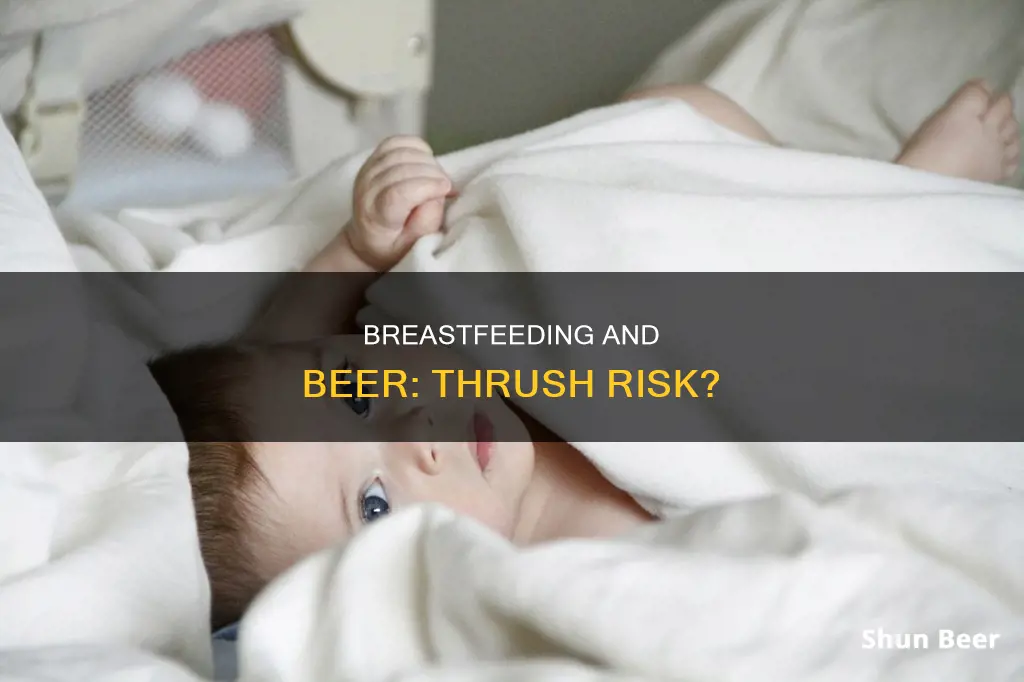
Breastfeeding and drinking alcohol are two topics that often raise questions for new parents. Alcohol can pass into breast milk and then into the baby when they are fed. While an occasional drink is unlikely to harm the baby, drinking above the recommended limit can be harmful to both mother and child. It can decrease milk supply and cause sleep, growth, and developmental problems for the baby. Thrush is a type of yeast infection that can occur in the mouths of breastfed babies and on the nipples of breastfeeding mothers. It is caused by an overgrowth of the Candida albicans fungus, which can enter the body through cracked nipples or after a course of antibiotics. It is important to note that drinking alcohol while breastfeeding can increase the risk of thrush, as it can disrupt hormones and affect milk production, creating an environment where thrush can thrive.
What You'll Learn
- Alcohol passes into breast milk and can affect a baby's sleep and development
- Drinking in moderation while breastfeeding is likely fine, but drinking heavily may have consequences
- Thrush is a yeast infection caused by an overgrowth of the fungus Candida albicans
- Candida can enter the body through cracked nipples or after a course of antibiotics
- Thrush can be treated with antifungal medication and good hygiene

Alcohol passes into breast milk and can affect a baby's sleep and development
When a mother drinks alcohol, it can pass into her breast milk and, subsequently, into her baby's body when she feeds them. While an occasional drink is unlikely to harm the baby, regular drinking above the recommended limits can be harmful. It is recommended to wait for at least 2 hours after drinking before breastfeeding to allow the alcohol to leave the breast milk. Binge drinking is especially dangerous, and if this is a regular occurrence, it is advised to discuss it with a health visitor or GP.
Excessive alcohol consumption can decrease milk supply and affect a baby's sleep, growth, and development. Research has shown that alcohol can disrupt babies' sleep patterns, even after small to moderate amounts of alcohol. Additionally, some studies suggest that repeated exposure to alcohol in breast milk could have long-term negative effects on the baby's development. A 2018 study found that 6- and 7-year-old children who had been exposed to alcohol in their mother's milk as babies scored lower on reasoning tests than their peers who had not been exposed.
It is important to note that the amount of time it takes for alcohol to leave the body and breast milk can vary from person to person, depending on factors such as weight, the amount consumed, and the rate of consumption. The blood alcohol level and the level of alcohol in the milk are typically highest 30 to 60 minutes after drinking, so it is best to avoid breastfeeding during this time.
Beer and Pepto-Bismol: A Safe Mix?
You may want to see also

Drinking in moderation while breastfeeding is likely fine, but drinking heavily may have consequences
Drinking alcohol while breastfeeding is a topic that has been widely researched. According to the Centers for Disease Control and Prevention (CDC), the safest option while breastfeeding is to avoid consuming alcohol altogether. Alcohol can pass from the mother's breast milk to the baby, and the baby's immature liver may not be able to process it effectively.
However, for breastfeeding mothers who wish to consume alcohol, moderation is key. Drinking in moderation, or having one standard drink per day, is likely safe for the baby, especially if a gap of at least two hours is maintained between drinking and nursing or pumping. This allows the alcohol to leave the breast milk. The alcohol content of the drink should be considered, as one serving is typically defined as a 5-ounce glass of wine, 12 ounces of beer, or 1 ounce of hard liquor.
It is important to note that drinking alcohol can have negative effects on breastfeeding. It can decrease breast milk production and affect the baby's sleep patterns. Additionally, research suggests that repeated exposure to alcohol in breast milk could have long-term negative effects on the baby's development. Therefore, if a breastfeeding mother chooses to consume alcohol, it is crucial to do so in moderation and to prioritize the baby's health and well-being.
To maintain a sufficient milk supply, it is recommended to breastfeed or pump before consuming alcohol. Additionally, storing extra breast milk can help ensure the baby's nutritional needs are met while allowing for the alcohol to clear from the mother's system. It is also important to never bed-share with the baby after drinking alcohol, as this increases the risk of sudden infant death syndrome (SIDS).
In summary, while drinking in moderation is likely fine, it is important to prioritize the baby's health and well-being, as heavy drinking may have consequences for the baby's development and growth.
Beer and Erection Problems: Is There a Link?
You may want to see also

Thrush is a yeast infection caused by an overgrowth of the fungus Candida albicans
While I cannot confirm whether drinking beer while breastfeeding can cause thrush, I can provide you with information on thrush and its causes.
In breastfeeding women, thrush can lodge in the nipples, areolas, and breasts, causing significant pain, especially if the nipples are cracked and open. Nursing babies can get thrush in their mouths and on their tongues, known as oral thrush, which can be identified by creamy white spots or patches on the tongue, gums, roof of the mouth, or inside of the cheeks. Oral thrush in babies can be painful and may cause fussiness or trouble feeding.
Thrush infections can occur after taking antibiotics, as antibiotics may reduce the number of beneficial bacteria in the body, allowing the candida fungus to flourish. High blood sugar levels can also lead to yeast overgrowth, and women with diabetes are at an increased risk of developing thrush.
To prevent thrush, it is recommended to wash your hands often, reduce stress, eat a balanced diet with reduced sugar intake, and keep your nipples dry between feedings.
Beer and Ciprofloxacin: Is It Safe to Mix?
You may want to see also

Candida can enter the body through cracked nipples or after a course of antibiotics
Candida albicans is a fungus that lives in the digestive tract and on the skin. It is a naturally occurring organism that doesn't usually cause any problems. However, if it multiplies uncontrollably, it can lead to thrush, a type of yeast infection. Candida can enter the body through cracked nipples, providing an entry point for the fungus to infect the nipples, areolas, and breasts, causing significant pain. This may be more likely to occur if your nipples are cracked and open.
Another way Candida can enter the body is after a course of antibiotics. Antibiotics can reduce the number of beneficial bacteria in the body, creating an environment that allows the Candida fungus to flourish. This can lead to an overgrowth of Candida, resulting in thrush. It is important to note that thrush can also occur if your immune system is weakened or immature, as the healthy bacteria in your body may not be able to keep the fungus under control.
To prevent and treat thrush, maintaining good hygiene is crucial. This includes carefully washing your hands after breastfeeding and changing diapers, sterilizing items that come into contact with your baby's mouth, such as pacifiers and bottles, and frequently changing your breast pads. Additionally, keeping your nipples dry between feedings and maintaining a balanced diet with reduced sugar intake can help prevent thrush.
If you suspect that you or your baby have thrush, it is important to consult a doctor or healthcare provider. They can diagnose thrush through physical examination, microscopic analysis, and blood tests to rule out other types of infections. Treatment for thrush typically involves the use of antifungal medications, such as topical creams and oral gels, which can effectively eliminate the infection.
Can a Human Drink 100 Beers in 24 Hours?
You may want to see also

Thrush can be treated with antifungal medication and good hygiene
Oral thrush, or oral candidiasis, is a fungal infection caused by an overgrowth of the fungus Candida albicans. While it is more common in babies, people with immune deficiencies, and those who use steroid sprays to treat asthma, it can also occur in healthy individuals.
Oral thrush can be treated with antifungal medication and good hygiene. Antifungal drugs are the standard treatment for oral thrush, with topical antifungals applied directly to the tissue being the first line of defence. These come in the form of lozenges, syrups, pastilles, or dissolvable tablets that evenly disperse the medication in the mouth. Examples include clotrimazole lozenges, miconazole buccal tablets, and nystatin suspension or pastilles.
If topical antifungals fail to clear the infection, oral antifungals taken by mouth may be used. The preferred first-line option is fluconazole, which is available as a tablet or oral suspension. For more severe cases of thrush, or when other forms of treatment have not been effective, amphotericin B may be prescribed. Amphotericin B is an injection given intravenously over a period of around 2 to 6 hours to stop the spread of the fungal infection.
In addition to antifungal medication, good oral hygiene is crucial in treating thrush. This includes brushing teeth, gums, and tongue with a soft brush twice a day, flossing, and rinsing thoroughly with water. Warm saltwater rinses can also help control the bacteria that can worsen symptoms. Maintaining good oral hygiene helps prevent the recurrence of oral thrush.
Kicking the Beer Habit: Strategies for Sobriety
You may want to see also
Frequently asked questions
Drinking beer while breastfeeding is generally not recommended. The safest option is to avoid consuming alcohol altogether while breastfeeding. However, having an occasional drink is unlikely to harm your baby, especially if you wait for at least 2 hours after drinking before breastfeeding.
Drinking beer while breastfeeding does not directly cause thrush in the mother. Thrush is a type of yeast infection caused by an overgrowth of the Candida albicans fungus, which is naturally present in the body. However, cracked or damaged nipples, which can occur during breastfeeding, may increase the risk of developing thrush as it allows the fungus to enter the nipple or breast.
Drinking beer while breastfeeding does not directly cause thrush in the baby. However, alcohol consumption can decrease breast milk production and affect the baby's milk intake. This reduced milk intake may increase the risk of thrush in the baby's mouth, as the baby may not be getting enough breast milk to clear the fungus.







